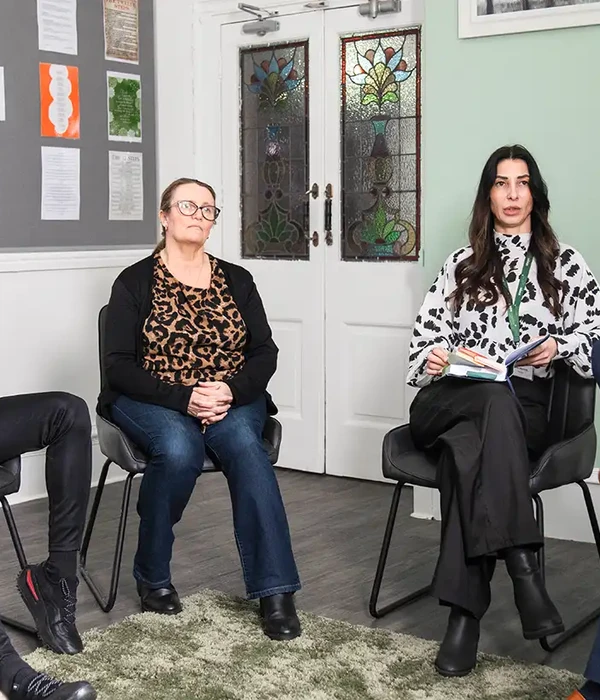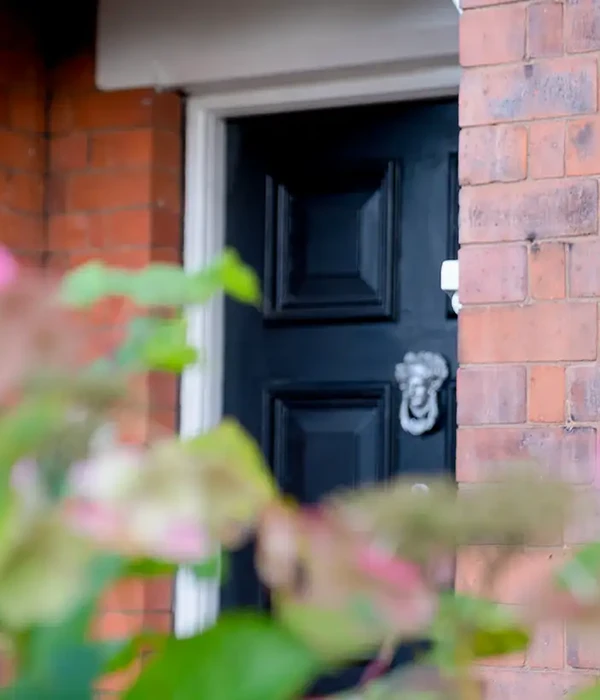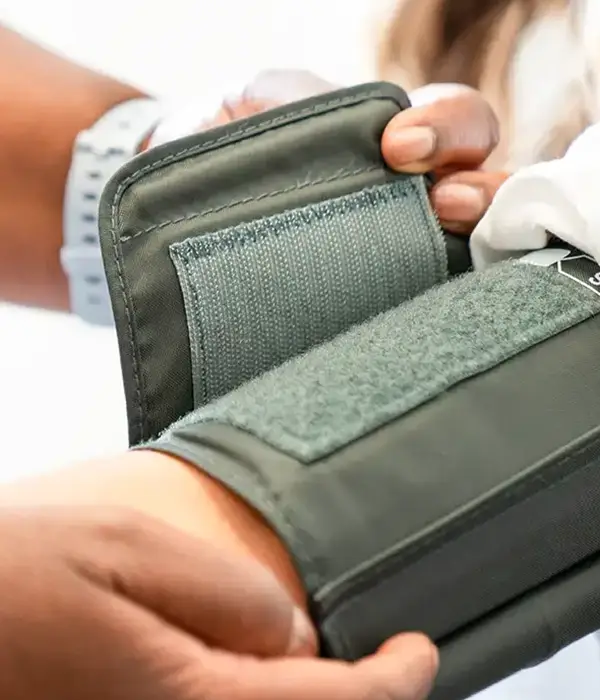Outpatient Counselling
Outpatient counselling can give you effective support for substance use and mental health conditions while letting you carry on with your daily life. You attend regular sessions with a trained counsellor but do not need to stay overnight in a hospital or clinic.
For many people, outpatient therapy offers a flexible and private way to focus on mental health without leaving their routine. This allows them to continue living their lives while getting much-needed treatment and support.

Take the First Step Towards Recovery
Steps Together offers personalised support and proven treatments, providing the care, guidance and encouragement you need to move forward with confidence and build a healthier future.

What Is Outpatient Counselling?
Structured outpatient counselling provides flexible, accessible psychotherapy for individuals dealing with addiction, mental health issues, or eating disorders. This type of care allows you to receive professional therapy, group support, and coping tools while continuing to live at home and maintain day-to-day responsibilities such as work or school.
This flexible approach provides evidence-based treatment and emotional support in a setting that works with your schedule. It can be a practical and effective way to receive the care you need while staying connected to your home, work, or community.
Differences Between Outpatient and Inpatient Treatment
Outpatient rehab means you attend scheduled sessions at a clinic, therapist’s office, or counselling centre and then return home. This form of treatment lets you continue with school, work, or family activities with little disruption while addressing a range of mental health disorders.
In contrast, residential treatment involves staying at a hospital or facility for 24-hour care and support. Inpatient settings are best suited for individuals who require constant supervision, medical support, or safety monitoring. Outpatient counselling is usually recommended for people with mild to moderate mental health challenges who can manage their routines safely.


Core Principles of Outpatient Therapy
Bespoke outpatient therapy is built on flexible treatment and personalised care. Your sessions are planned around your schedule, making it easier to balance treatment and everyday commitments.
Confidentiality is a key principle; what you discuss with your therapist during treatment hours remains private. Therapy may focus on building coping skills, understanding your thoughts and feelings, and working towards clear goals for mental health improvement.
Outpatient Treatment Approaches
There are several effective ways to receive outpatient treatment. Each of these approaches has its benefits and uses different methods:
Individual Therapy
In individual therapy, you work one-to-one with a trained counsellor or psychotherapist. This private setting allows you to discuss personal issues, feelings, or life events openly without worrying about judgment.
Many individual therapies are evidence-based. Cognitive behavioural therapy (CBT) and Dialectical behaviour therapy (DBT) are common choices. Other approaches include Eye Movement Desensitisation and Reprocessing (EMDR), which helps patients process trauma.
Family Therapy
Family therapy involves you and your family members working together with a therapist to address issues and concerns. The therapist helps your family improve communication, solve problems, and foster a better understanding among members.
This approach can benefit families dealing with conflict, divorce, behavioural issues, or mental health challenges. Evidence-based models, such as systemic family therapy, focus on how each person’s actions affect the others.
Group Therapy and Support Groups
Group therapy lets you meet with several people who may have similar issues or experiences. A trained facilitator leads sessions. You can learn from others, find support, and see that you are not alone.
Typical group types include support groups for addiction, depression, anxiety, or grief. Group sessions often utilise evidence-based treatments, such as cognitive-behavioural therapy, to help members develop coping skills together. Support groups also encourage sharing and listening.
Creative and Alternative Therapies
You may prefer creative or alternative therapies if you find it challenging to express your feelings through words alone. These methods can include art therapy, music therapy, and dance therapy.
In art therapy, you use drawing, painting, or other visual arts to explore your emotions. Music therapy involves listening to or creating music as a means of processing emotions. Dance therapy utilises movement to address emotional or psychological challenges.
Services that our multi-speciality addiction rehabilitation centres offer
Outpatient Counselling for Relationships
Outpatient Counselling for Relationships

Process of Outpatient Programmes
Outpatient counselling programmes use structured and personalised approaches to support individuals with mental health and substance use challenges. The process begins with a thorough assessment to understand your specific needs and goals.
A tailored treatment plan is then created, which may include individual therapy, group sessions, or medication support. Your progress is closely monitored to ensure your treatment stays effective and relevant. This type of care allows you to maintain normal life while receiving professional mental health support in a flexible setting.
Assessment and Personalisation
The process often begins when a GP or another healthcare provider refers you to a mental health professional. Sometimes, you can also self-refer, depending on the service you’re seeking. During your first appointment, you meet with a therapist or a consultant psychiatrist.
You’ll get a treatment plan tailored to your unique mental health concerns. Your therapist or psychiatrist will work with you to identify the problems you want to address. You and your therapist agree on achievable treatment goals, which may include improving mood, managing anxiety, or learning to solve specific problems.

Types of Outpatient Treatment Available
Challenges in an Outpatient Treatment Programme
As flexible as outpatient support can be, it often faces unique challenges. You may face barriers that make it hard to keep up with sessions or manage day-to-day symptoms and emotions. Some of the challenges to outpatient care include:
Barriers to Engagement and Adherence
You may find it challenging to attend regular sessions due to busy schedules, work-related stress, or transportation issues. Balancing appointments with other commitments can create extra pressure. Feeling nervous or having low self-esteem can also make it hard to reach out for help or stay involved in counselling.
Clients sometimes worry about being judged, especially when talking about sensitive issues like addiction, anger, or interpersonal difficulties. This can lead to missed sessions or early dropouts. It helps to have flexible scheduling options and supportive communication from your counsellor to address these issues.
Managing Stress, Difficult Emotions, and Coping Skills
Daily life often brings stress from work, family, or personal issues. Outpatient therapy helps you find ways to manage stress, develop new coping skills, and handle difficult emotions like anger, sadness, or anxiety.
Handling low self-esteem, infertility concerns, and interpersonal difficulties takes both time and self-reflection. Counsellors can help you set realistic goals and teach you stress management techniques, such as deep breathing exercises, problem-solving steps, and guided imagery.
Medication and Symptom Management
Medications are often used in mental health treatment. Outpatient treatment may be part of a wider care plan that involves medication management. Keeping track of medication, understanding side effects, and remembering to take prescriptions as directed are common challenges.
Open communication between you, your counsellor, and other health professionals is important. If you experience new symptoms or side effects, mentioning them during counselling can help you stay safe and comfortable.

Outpatient Treatment Options Can Help You Heal
Outpatient counselling offers structured addiction treatment and mental health support while allowing you to maintain daily activities at home, work, or school. Service can vary and can include both one-on-one sessions and group therapy, with levels of intensity tailored to your needs and diagnosis.
At Steps Together, we can offer this flexible outpatient mental health and addiction treatment to help you recover while you live your life. You can change your life without having to pause it by living in a treatment centre.
Frequently Asked Questions
How does outpatient therapy for depression typically operate?
You will usually meet a counsellor or therapist for regular scheduled sessions. These appointments may occur once or twice a week. There is usually a starting assessment to work out your needs. Your therapist may adjust the approach if your symptoms change or if another method is likely to be more effective.
What distinguishes outpatient therapy from inpatient care?
Outpatient therapy lets you return home after each session. You keep your usual routine and only come in for scheduled appointments. Inpatient care means you stay at a clinic or hospital for 24-hour support and structured treatment.
What level of outpatient cover is advisable for an individual to have?
The level of cover you need depends on your symptoms, goals, and support network. Those with mild or moderate needs may benefit from weekly sessions. If your situation is more complex, extra one-to-one or group support might be recommended.
What are the different types of mental health services available on an outpatient basis?
On an outpatient basis, you may access individual counselling, family therapy, and group therapy. Some services may also offer skills workshops or support with medication reviews. Certain clinics offer outreach or crisis intervention services as needed.
Can you elaborate on the scope of services provided by outpatient therapy?
Services commonly include one-to-one talking therapy, mental health assessments, group sessions, and support managing medication. Some programmes offer skills training or advice on lifestyle and self-care.
What does an intensive outpatient programme involve?
Intensive outpatient therapy involves attending sessions more frequently, often several times a week, and sometimes for full or half-day sessions. These programmes may include a mix of group, family, and one-to-one therapy, as well as classes on managing stress or building social skills.





